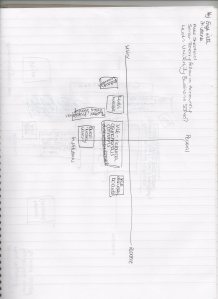I attended a workshop run by David (from the University of Oxford’s continuing education department, where he co-manages the TALL (technology-assisted lifelong learning) research and development group) yesterday. Thought-provoking stuff, not least because the subject is closely linked to my big question for #ocTEL, and my musings on digital expectations gap!
‘Visitors and residents’ relates to a concept developed by David and Alison Le Cornu regarding students’ (and teachers’) online activities (not exclusively their educational activities, but with an educational focus).
David explained that he views online behaviours as a continuum. At one end there is visitor activity – where the web is used like a toolbox, thinking happens offline and the user ‘goes in’ to the web to do their task (e.g. searching for info on Google). At the other end there is resident activity – where the web is used to connect with people, and where a lasting footprint will remain of your activity (e.g. a social media profile etc). I like the idea of continuums not binaries, and I feel this is more sophisticated than Prensky’s digital natives and digital immigrants – and doesn’t make assumptions based on age, technological skills etc.
David got the participants to map them selves on the visitors and residents continuum, for each tool we use (e.g. Twitter, VLE, LinkedIn, Facebook etc) – emphasising the point that a person may exhibit visitor characteristics in one tool, but resident in another. Some tools might lend themselves to residency (e.g. social media), but you could use those as a visitor (e.g. reading a Twitter feed but not posting yourself would be a visitor type characteristic). My very rough map is attached – I was taking notes on my tablet but my drawing skills weren’t up to this so I had to resort to pen and paper!
The workshop raised interesting questions (based on interview transcripts from a range of UK and US HE students and staff) about the tensions for students between the convenience of Google, patterns of habit regarding information searching, cultural norms (e.g. is a book more authoritative than the internet?) and relatively basic critical evaluation skills in the majority – not surprising, due to speed of expansion of the information space and fact that these skills are not often taught pre-university, but implicitly expected in HE.
He suggests we need to foster these skills more explicitly, pre-HE and throughout a student’s time at university. I couldn’t agree more, and have been trying to do this with my students… but deep pedagogical shifts are needed. He’s positive about this, and suggests that now information is much more easy to find than in the pre-digital age, this can free us up to spend more time on critical thinking.
He suggests formal education is predicated on the visitor characteristics, and while there isn’t an implied superiority of resident over visitor, one of the roles of HE would be to inform and engage students in resident behaviours as well as visitor ones -i.e. scaffolding flexibility among learners, as this is likely to be demanded in the workplace of the future. We pondered whether subject discipline might affect the behaviours – and there is a strand of the project that will investigate this. There are also tensions in the interview findings about collaboration, plagiarism, and appropriate strategies – avoiding a learning ‘black market’ and developing good academic practice in this area.
Links:
David White’s homepage:
http://www.conted.ox.ac.uk/staff/academicstaff/profile.php?a=alpha&id=8
Visitors and residents paper (2011): http://www.uic.edu/htbin/cgiwrap/bin/ojs/index.php/fm/article/viewArticle/3171/3049
Visitors and residents project
